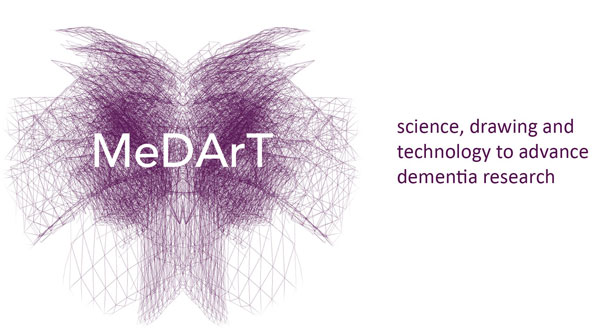
MeDArT is a collaborative research project between New Zealand’s Massey University and France’s Institut Claude Pompidou and Institut de Chimie de Nice, Université Côte d’Azur, engaging science, drawing and technology to advance dementia research.
Someone in the world develops dementia every 3 seconds. According to the World Alzheimer’s report 2015 the number of people with dementia worldwide will nearly double every 20 years. To respond to our ageing population, methodologies need to be developed that engage the human senses for early diagnosis, recall, stimulation, autonomy and art therapy for people with dementia.
The project will take place in France and New Zealand between 2018 -2024 and is supported by Alzheimers New Zealand and Dementia Wellington. Fundraising for the research project is being done through Massey University’s charitable arm; the Massey University Foundation.
3 Projects over 5 years
MindArT
Dual care for people with dementia and their supporters through material and digital drawing.
Massey University and L’Institut Claude Pompidou, CoBTEK/ CMRR, Nice
A dual care nature based sensorial material/ digital drawing and meditation programme for people with dementia and their supporters.
Exploring the hypothesis that fine motor capabilities are retained in the neurodegenerative pathologies of Alzheimer’s Disease (AD) and by working with these relatively preserved capacities, we can help maintain proficiency and expect an improvement in the verbal and non-verbal communication level of the people with dementia by giving them an opportunity to express in another medium that isn’t oral.
GRAPHE
To study if graphic parameters using digital technology can represent early markers of Primary Progressive Aphasia.
Massey University and L'Institut Claude Pompidou, CoBTEK/ CMRR, Nice
The Graphe project is based on using non-invasive advanced technologies to help early diagnosis of Alzheimer’s Disease (AD) and Frontotemporal Lobar Degeneration (FTLD). In order to establish a health plan for the person in need and their relatives as soon as possible, early detection of the discriminating signs of the disease, is fundamental. This allows the person to maintain their quality of life and retain autonomy through pharmacological and non-pharmacological strategies for as long as possible. Language and motor skills are the first functions to be compromised, with suspected AD and FTLD people reporting difficulties to read and write. Therefore, studying writing/drawing, for AD and FTLD research today is vital.
Draw me an odour
Massey University and Institute of Chemistry - Nice, Université Côte d’Azur, Nice
Draw me an odour is a transdisciplinary project dedicated to developing a deeper understanding of the links between the sense of smell, colour and gesture. The project will aim at evaluating the potential influence of an olfactory stimulation to artistic production and how these findings can then be potentially applied to creative workshops to engage fine motor skills for people with Dementia. The central question is the possibility of enhancing cognitive performance with the use of non-pharmaceutical protocol. Olfactory stimulations could be applied to promote better performance, concentration, recall, autonomy and flexibility in daily tasks.
Donate now